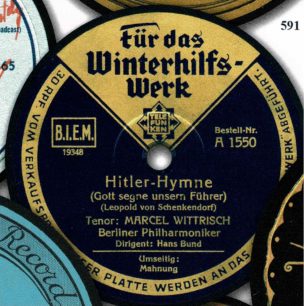One record that DG won’t be reissuing
Orchestrasfound by one of our readers on a collectors’ site.
Here’s what it sounds like.

found by one of our readers on a collectors’ site.
Here’s what it sounds like.
The autograph manuscript of the fourth movement of…

We have been notified of the passing of…

The numbers are in at the Erl winter…

Franz Welser-Möst has pulled out of the opening…

Session expired
Please log in again. The login page will open in a new tab. After logging in you can close it and return to this page.
Not DG but presumably, Telefunken will not issue a release. The LP bears that name.
The much admired Gerhard Husch recorded ‘Der Hackenkreuz’ for Telefunken.
This post does not belong on this or any other site.
Why would DG reissue this? DG never owned Telefunken. I think Warner Classics does today.
If I read the label correctly, this is not a Deutsche Grammophon release. It is a Telefunken release.
What a truly abominable historical remnant. Wittrisch was a principal tenor both at the Berlin Opera and in a series of operetta movies which continued through WW2.
As to how much he was actually involved in Nazi politics directly I haven’t been able to find out. He was able to continue his career at Stuttgart and Bayreuth after the war it would seem without too much objection from the denazification courts?He was considered a kind of replacement for Richard Tauber who had very wisely fled the regime .
Wittrisch the artist was certainly a singer of merit. He was born in Belgium to a family of German origin.
It is unnerving to hear him singing the praises of Hitler , even more unnerving to think of those who went out and bought this record !
What’s on Side B? Richard Strauss’s Op 88 No. 1?
Marcel Wittrisch, born in Antwerp, was certainly versatile.
Before the Nazi regime banned Meyerbeer’s he recorded music from LES HUGUENOTS.
After World War II, British Decca signed him up for operetta arias, including “Zwei Marchenaugen” by Kalman.
The Wirral Globe, a local Liverpool rag has a story about U 534 sunk off the Kattegat, it is now moored at Woodside. They found a vast collection of classical records in after it sunk below 220ft.
The fragile shellac discs survived 48 years entombed inside a sunken Nazi submarine, U-534, at a depth of 220ft in the frigid waters of the Kattegat. The vessel is now situated at Woodside.
The records have recently been discovered, conserved and played once again. The team at heritage organisation Big Heritage set out to see if these battered discs, which they’ve nicknamed ‘shipwreckords’, could still play music, and the results were better than anyone could have imagined.
It is believed to be the only time in history that phonographic records have been recovered from a shipwreck in playable condition.
U-534 was sunk by RAF bombers in the final days of WW2 after refusing to surrender, a defiant action which fuelled decades of speculation about secret missions and valuable cargo.
The entire crew of 52 escaped, though three later died in the water, making the submarine a tempting target for treasure hunters.
A costly salvage operation in 1993 raised the vessel and found no hint of gold, paintings and other treasures, but the interior of the boat and its contents were described as in a “remarkable state of preservation”.
The Big Heritage team is the new custodian of U-534 which will form a new Battle of the Atlantic Centre at Woodside in partnership with Mersey Ferries and Wirral Council.
The project is part of a multi-million-pound regeneration scheme funded by the Department of Housing and Levelling Up. The first test was performed inside the Western Approaches bunker in Liverpool, the headquarters of the battle against the U-boats now operated as a museum by Big Heritage.
A vintage wind-up gramophone was set up in the main operations room, and soon the huge space echoed to the eerie sound of Bach’s Air on the G-String, Schubert’s Winterreise and Strauss’ Künstlerleben, as well as a selection of German popular singers like Zarah Leander and Gerhard Hüsch.
Kyle May from Big Heritage, who led the project, described hearing the records as “an eerie experience.”
He recalled: “I was fussing about setting up the cameras, audio gear, etc, but when the music started, all of that just melted away and we stood there transfixed.
In that same room 80 years ago, U-boats were just little markers on the map to be snuffed out, but here we were decades later listening to the enemy’s records.
It really hits you how they were just young lads, homesick and missing their loved ones, using music to distract themselves; no different to the Allied veterans we meet, really.
You might not expect a crackly old Strauss waltz to stimulate such strong feelings of empathy, but that’s the power of history for you.
Liverpool-based vinyl experts Chris Hough and Richie Clark consulted on the project using a vintage all-analog setup before digitising the tracks with modern equipment.
It’s hoped the digitised music will form part of the new exhibition in Birkenhead.
This May will see Liverpool host both the Eurovision Song Contest and the Battle Of The Atlantic 80th anniversary events, and this latest discovery neatly threads a needle between the two.
These silt-stained records may have been produced in Nazi Germany but they remain a powerful, tangible reminder of how music can maintain our humanity even during the most inhuman times.
Dean Paton, Managing Director of Big Heritage, said: “This is an incredible discovery that brings the history of U-534 to life in a way that we never thought possible.
U-534 is renowned for being one of the most technically advanced submarines in the world when it was in service, but we’re more interested in the human element of the crew, all young men who would mostly have been no older than 15 when war broke out.
These records show a human side to the U-Boat crew, they were normal men.”
A stark reminder from history of how normal people can be convinced to do awful things by tyrants.”
Big Heritage hopes to organise listening sessions for the public in the near future.
The historian Mark Felton toured the wreck of U 534 before it was restored. Here is his video about it
https://www.youtube.com/watch?v=8DSHzwHiAok
German U Boats had a major design problem. You could not use the lavatory submerged. This was because they did not have bilge tanks to store waste, unlike British & US subs which could. German designers tried to save weight by omitting bilge tanks, so the waste was discharged directly but only while surfaced. Clearly this caused major hygiene problems while submerged! They had to use pots and pans and steel helmets!
Near the end of the war, the U-1206 had a special lavatory fitted with a complicated series of valves & air locks, which could be operated submerged. However to use the lavatory submerged one had to have a mechanic to assist you. The Captain of U-1206 tried to use it without assistance and flooded it, resulting in it sinking completely.
A recording also released on the 4 CD box ‘Entartete Musik’. Marcel Wittrisch recorded it on October 2nd, 1933. He never was a member of the NSDAP. Compare it to ‘Das Hakenkreuz’ and ‘Deutschland erwache’ by Gerhard Hüsch from 1934 (CD OPAL ‘The Rise of Fascism’) and the many recordings by Wilhelm Strienz…
Some factual context for the simplistic emotions.
A Telefunken LP. Telefunken took over DGG in 1937. DGG had been founded in 1898 by the German-American Emil Berliner. In 1941 DGG was sold on to Siemens and Halske, which led the brand to huge successes after WW2. Philips got involved in 1962, which gave rise to PolyGram. The rest, as they say, is history.
Yet more proof that the Devil has all the mediocre tunes.
Thanks for ruining our day …
wouldn’t be so sure about that
Of course DG would not be reissuing a Telefunken recording. Those belong to Warner.
Telefunken, not DG.
It is always disappointing when an artist you think highly of turns out to have had feet of clay. The irony is that the Nazis destroyed the original masters to some of his finest recordings because … they were music of Meyerbeer.
While perhaps not on the same level of evil, both Martinelli and Gigli recorded Giovinezza, the hymn of the Italian fascists.